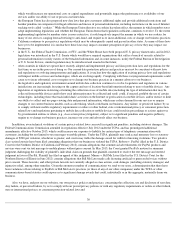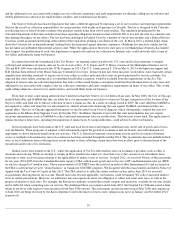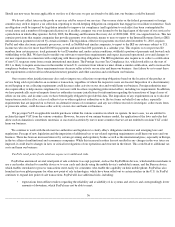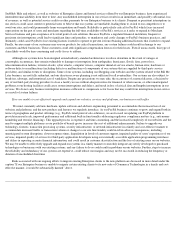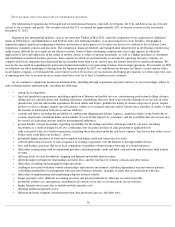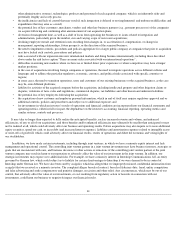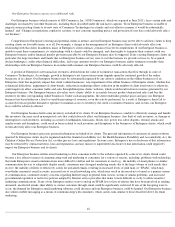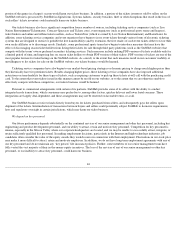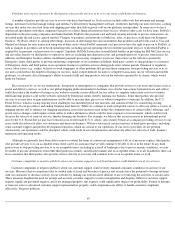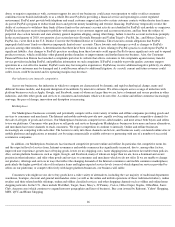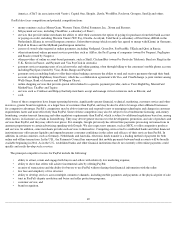eBay 2013 Annual Report Download - page 42
Download and view the complete annual report
Please find page 42 of the 2013 eBay annual report below. You can navigate through the pages in the report by either clicking on the pages listed below, or by using the keyword search tool below to find specific information within the annual report.
These factors may cause our international costs of doing business to exceed our comparable domestic costs. As we expand our
international operations and have additional portions of our international revenues denominated in foreign currencies, we also could become
subject to increased difficulties in collecting accounts receivable and repatriating money without adverse tax consequences, as well as increased
risks relating to foreign currency exchange rate fluctuations. The impact of currency exchange rate fluctuations on our business is discussed
above in more detail under the caption “We are exposed to fluctuations in foreign currency exchange rates and interest rates”.
Compliance with complex foreign and U.S. laws and regulations that apply to our international operations increases our cost of doing
business. These numerous and sometimes conflicting laws and regulations include internal control and disclosure rules, data privacy and filtering
requirements, anti-corruption laws, such as the Foreign Corrupt Practices Act and U.K. Bribery Act, other local laws prohibiting corrupt
payments to governmental officials, and antitrust and competition regulations, among others. Violations of these laws and regulations could
result in fines and penalties, criminal sanctions against us and/or, our directors, officers or employees, prohibitions on the conduct of our
business and on our ability to offer our products and services in one or more countries, and could also materially affect our brands, our
international expansion efforts, our ability to attract and retain employees, our business, and our operating results. Although we have
implemented policies and procedures designed to ensure compliance with these laws and regulations, there can be no assurance that our
employees, contractors, or agents will not violate our policies.
In addition, we conduct certain functions, including product development, customer support and other operations, in regions outside the
U.S., particularly in India and China. We are subject to both U.S. and local laws and regulations applicable to our offshore activities, and any
factors which reduce the anticipated benefits associated with providing these functions outside of the U.S., including cost efficiencies and
productivity improvements, could adversely affect our business.
We maintain a portion of our research and development facilities and personnel in Israel, and have acquired other Israeli companies.
Political, economic and military conditions in Israel affect those operations. Increased hostilities or terrorism within Israel or armed hostilities
between Israel and neighboring countries or other entities could make it more difficult for us to continue our operations in Israel, which could
increase our costs. In addition, many of our employees in Israel could be required to serve in the military for extended periods of time under
emergency circumstances. Our Israeli operations could be disrupted by the absence of employees due to military service, which could adversely
affect our business.
Acquisitions, joint ventures and strategic investments could result in operating difficulties, dilution, and other harmful consequences.
We have acquired a significant number of businesses of varying size and scope, technologies, services and products. In December 2013, we
acquired Braintree, which provides an online and mobile payments platform. We expect to continue to evaluate and consider a wide array of
potential strategic transactions as part of our overall business strategy, including business combinations, acquisitions and dispositions of
businesses, technologies, services, products and other assets, as well as strategic investments and joint ventures. At any given time we may be
engaged in discussions or negotiations with respect to one or more of these types of transactions. Any of these transactions could be material to
our financial condition and results of operations.
These transactions involve significant challenges and risks. Some of the areas where we may face risks or difficulties include:
40
•
seasonal reductions in business activity;
•
expenses associated with localizing our products and services, including offering customers the ability to transact business in the local
currency and adapting our products and services to local preferences (e.g., payment methods) with which we may have limited or no
experience;
•
foreign exchange rate fluctuations;
•
our ability to repatriate funds from abroad without adverse tax consequences;
•
the possibility that foreign governments may impose currency controls or other restrictions on the repatriation of funds;
•
changes in the business practices of the card networks or participating banks (e.g., dynamic currency conversion);
• volatility in a specific country's or region's political, economic or military conditions (e.g., in South Korea relating to North Korea);
and
•
challenges associated with maintaining relationships with local law enforcement and related agencies.
•
the need to integrate the operations, systems (including accounting, management, information, human resource and


